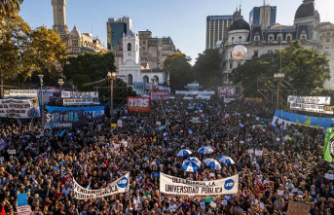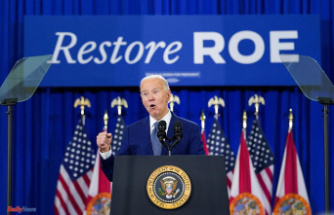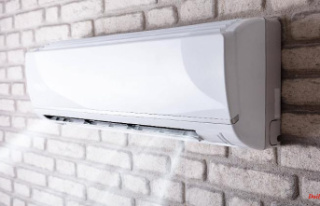FBI officials are hauling crates of official documents out of Donald Trump's estate. The ex-president's supporters are speculating about a perfidious "deep state" plan. If Trump is charged and found guilty, it could mean the end of his career.
Investigators in the United States had tried a nicer way. But the investigators couldn't really get hold of the ex-president. So a search warrant was issued for Donald Trump's Florida residence, which the FBI carried out. The parties involved took boxes of documents from his Mar-a-Lago estate. government documents Trump had taken from the White House and elsewhere and dumped in the basement there; possibly so that they would not fall into the hands of anyone who did not like them and subsequently fall on their feet.
Other explanations are circulating among Trump's supporters. For example, that the investigation was just an excuse to look for other incriminating evidence. Or: The FBI may have obtained a search warrant with falsified evidence, placed fictitious documents during its execution and bugged Mar-a-Lago on the occasion to harm Trump. The date of the search, August 8, also makes some people sit up and take notice: Richard Nixon handed in his resignation on this day in 1974 because of his illegal actions against political opponents.
"When it comes to the deep state, there are no coincidences," Monica Crowley, a former senior Treasury official under Trump, murmured on Trump's former chief strategist Steve Bannon's War Room podcast or tomorrow, but they chose August 8th for a reason." US Attorney General Merrick Garland himself approved the search, he said. A federal court approved it because of a reasonable suspicion.
A few days have passed since Monday and many questions have now been answered. But not all. According to the search warrant, prosecutors are investigating the ex-president for possible crimes, including under the anti-espionage law. This prohibits the withholding of national security information that could harm the United States or benefit another state. It is also forbidden to steal documents, hide them or destroy them in order to hinder an investigation.
This is said to have been the case with Trump, because a number of confiscated documents in the 20 or so boxes have the highest level of confidentiality. The list of items taken, published by the Ministry of Justice, includes the secret documents, the pardon for controversial confidant Roger Stone and information about the "President of France". Exactly what they contain is now open to speculation. Perhaps Trump had something to hide and therefore took the documents with him?
According to a variety of reports, Trump has been rather messy throughout his presidency, failing to abide by the legal rules for a US head of state. According to the law, he must hand over all official documents to the National Archives at the end of his term of office. But Trump is said to have often simply torn them up after reading them, reported the US broadcaster CNN. According to a New York Times journalist, he sometimes flushed them down the toilet in the White House, which craftsmen then had to unclog.
Trump pleads innocent and says you could have just asked him for the papers and he would have handed them over. Since Monday he has been trying to benefit from the discussion about the FBI's action and his person. Immediately after the raid, his campaign organizations ran advertisements and appealed for donations via text messages and emails about the FBI's actions. At the same time, allies called Trump encouraging him to run for the 2024 Republican presidential nomination, and he also met with Republican lawmakers.
According to US media, the residence of an ex-president has never been searched during his lifetime. He said his residence had been besieged, attacked and occupied. In the days since the search, high-ranking Republicans and supporters have been outraged in rows. Trump demanded that the search warrant be published, which Attorney General Garland promptly did. The ex-president had been in possession of the paper since Monday and should have shared its content himself. Ditto for the list of things the FBI took away.
After the end of Trump's presidency, the employees of the National Archives noticed that secret documents were missing. So a lawyer for the archives asked Trump's employees. The boxes contained letters, records, newspapers, magazines and articles that would "one day" become part of a presidential library, Trump said. There was back and forth for many months, but in January Trump only handed over a few documents to the authority.
The National Archives then turned on the Ministry of Justice. In June, the FBI visited the ex-president and took 12 boxes from the basement of Mar-a-Lago, writes the Washington Post. According to one of Trump's lawyers, they complained that access was not secured enough. So Trump's staff would have installed a lock. But apparently the investigators suspected other explosive documents in the remaining boxes. So on Monday the FBI rolled out.
"This is theatre, intended to harm the President and Republicans in the congressional elections and to further the interests of the Democratic Party," rumbled Michael Caputo, a longtime Trump confidant and former Health Department spokesman. As far as is known, however, the search involved everything that was legal. More than 30 FBI agents were on the site most of the day, and the Secret Service, which also protects former presidents, had been notified. According to his own statements, US President Joe Biden knew nothing about it in advance. The White House has not commented on the process.
It will be further asked where the FBI's suspicions came from. To put it another way: if the FBI was allowed to take everything with them when they visited in June, why did they suddenly assume that Trump had something to hide? Many speculate that it may have been a former Trump confidante who switched sides and became an informant.
Trump supporters and former associates have never been averse to conspiracy theories. The "deep state," meaning agencies pursuing their own political agendas by any means necessary, is also a common theme. However, the speculation triggered by the FBI had assumed larger dimensions, writes "Politico". The two reasons are great fear that that "deep state" wants to eliminate Trump politically - i.e. prevent him from running for president again - and the lack of accessible information on how the Justice Department and the FBI, a mixture of law enforcement agency and domestic intelligence, work at all.
A conviction could actually end Trump's political career. The anti-espionage law carries a maximum sentence of 10 years in federal prison and the obstruction of investigation law carries a maximum sentence of 20 years. If the ex-head of state is convicted of destroying records, he could even lose his right to hold public office again. A renewed presidency would be impossible. But first, investigators must decide whether to press charges at all. If so, the tone in public is likely to be even more shrill than it already is.
(This article was first published on Saturday, August 13, 2022.)












